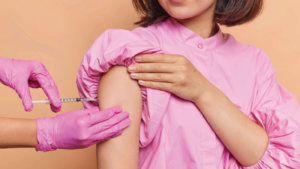Did you know that cervical cancer is the fourth most common cancer in women globally(1)?
What is cervical cancer?
Cervical cancer is a type of cancer that occurs in the cervix, a small canal that connects the uterus and vagina. When a woman is expecting, the cervix helps keep her baby in place until the child is fully developed. The cervix widens during childbirth so that the baby can be born.
While cancer usually takes place when one or more genes in a cell change or mutate, there are other identifiable factors that specific cancers can be attributed to. For cervical cancer, one of the top causes includes strains of sexually transmitted infections (STIs) such as the human papillomavirus (HPV).
Almost all sexually active people will be infected with HPV at some point in their lives. Even though one’s immune system can naturally clear the HPV virus from the body, persistent infection with high-risk HPV strains can cause abnormal cells to develop, leading to cervical cancer.
The most common HPV strains that account for about 70 per cent of cervical cancer are the subtypes 16 and 18 (also known as HPV16 and HPV18).
What are the symptoms of cervical cancer?
Cervical cancer usually displays no signs or symptoms in the early stages. As the cancer advances, symptoms may include:
- Irregular or abnormal vaginal bleeding after sexual intercourse, between periods, or after menopause.
- Increased watery vaginal discharge with a foul odour and the presence of blood spots.
- Unexplained and persistent pelvic or back pain.
- Pain during sexual intercourse.
If you experience any of the above symptoms, visit a doctor as soon as possible for a detailed checkup. An early cervical cancer diagnosis and treatment increases one’s chances of remission and recovery.
What are the risks of cervical cancer?
Besides HPV infection, other risk factors of cervical cancer include a weakened immune system and herpes. Smoking tobacco or exposure to secondhand smoke also increases one’s risk.
Studies have also shown that women who have used oral contraceptives such as birth control pills for five or more years have a higher risk of cervical cancer than those who have never used them. Ten years after stopping the pill, a person’s risk is no longer increased – as if the pill was never used (2).
Can cervical cancer be prevented?
All females aged 9 to 26 are highly recommended to receive HPV vaccination. The vaccines can protect one against specific strains of HPV that may lead to cervical cancer.
Recommended HPV Vaccine Schedule And Dosing
* Recommended age: Females aged 9 to 26, or as advised by a doctor
* Vaccination schedule
- <15 years old: A 2-dose schedule is recommended for people who get the first dose before their 15th birthday.
In a 2-dose series, the second dose should be given 6–12 months after the first dose (0, 6–12-month
schedule). - >15 years old: A 3-dose schedule is recommended for people who get the first dose on or after their 15th birthday, and for people with certain immunocompromising conditions.
In a 3-dose series, the second dose should be given 1–2 months after the first dose, and the third dose should be given 6 months after the first dose (0, 1–2, 6-month schedule).
*The above schedule is recommended by CDC(3). Schedules may vary from country to country.
How often should cervical cancer screening be done?
Women between 21 and 29 years old who have had sexual intercourse, are recommended to get a Pap Smear once every three years.
Women between 30 and 65 years old are recommended to get dual tests (HPV test and Pap Smear test) once every 5 years, or a Pap Smear test or HPV test once every 3 years.
During a Pap smear or HPV test, cells from the cervix will be collected and examined for abnormalities.
Does vaccination mean we can possibly see the end of cervical cancer?
Vaccination against HPV is a powerful tool in the fight against cervical cancer. Encouraging every eligible woman to get vaccinated is not just a personal decision, but a collective responsibility.
By increasing awareness and encouraging vaccination, we can create a protective barrier that not only shields individuals but also contributes to the broader goal of eradicating cervical cancer globally.
If you know someone aged 9 to 26 who has yet to receive the HPV vaccine, share this article and encourage them to get vaccinated.
Together, we can beat cervical cancer!
References
(1 )World Health Organization – Who.int 2023 (Accessed 11 January 2023)
(2) The United State Government – National Cancer Institute
(3) CDC – HPV Vaccine Schedule and Dosing
(Source: by Raffles Medical Group)








